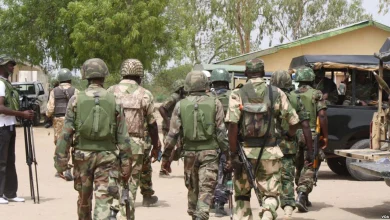
In response to the increasing security concerns from an influx of bandits and fighters from the Islamic State’s West Africa Province (ISWAP) into South-Western Nigeria, governors and traditional rulers are collaborating on strategies to secure the region.
The move comes after reports of armed insurgents fleeing military operations in the North-West and seeking refuge in the forests of the South-West.
Oyo State Governor, Seyi Makinde, raised alarms last week about the potential threats posed by these groups, stating that bandits from the North-West are relocating to Oyo due to intensified military operations in their regions. Speaking at the 2025 annual inter-faith service for workers in Ibadan, Makinde assured the public that state authorities would act swiftly to address the issue, saying, “But we will find and deal with them.”
Meanwhile, the Ogun State government has reached out to relevant security agencies, including the police and military, to prevent any escalation in the state, while also confirming that proactive measures are in place.
The Department of State Services (DSS) has already made significant strides in tackling the issue, arresting 10 suspected ISWAP members in Ilesa, Osun State. The suspects were detained following a Federal High Court order to extend their detention. These arrests underline the growing concerns over the activities of insurgents in the region.
In response to the ongoing threat, the Oodua People’s Congress (OPC) has urged all six South-West governors to treat the establishment of camps by fleeing terrorists in the region’s forests as a security emergency. OPC President, Wasiu Afolabi, stated, “Yorubaland can never be conquered or occupied by foreign invaders.” The group has pledged its support to security agencies, offering its assistance in confronting the growing menace.
Lagos State Governor, Babajide Sanwo-Olu, who chairs the South-West Governors’ Forum, has been consulting regularly with his counterparts across the region, receiving daily intelligence updates to better assess and address security concerns. While the governor has emphasized that there is no confirmed evidence of bandits in the region, he assured the public that the South-West would be well-prepared to tackle any emerging threats.
In Oyo State, Governor Makinde’s administration has ramped up efforts to secure the state by strengthening collaboration among security agencies. Special Adviser on Security, Fatai Owoseni, emphasized the importance of involving local governments and traditional rulers in security efforts, saying, “Security is everybody’s business, and we all have a role to play in ensuring that our state is safe from the antics of bandits.”
Additionally, Osun State has supported its security agencies, resulting in the arrest of suspected terrorists who were attempting to establish a foothold in the state. Special Adviser to the Governor on Security, Samuel Ojo, confirmed that proactive measures were being taken to prevent any terrorist infiltration, including the interception of 84 illegal migrants entering the state.
Traditional rulers in the South-West have also been vocal in their concerns, calling for urgent action. The Orangun of Oke-Ila, Oba Adedokun Abolarin, emphasized the critical role of traditional institutions in ensuring the security of the region, while the Akarigbo of Remoland, Oba Babatunde Ajayi, stressed the need for increased vigilance and coordination between traditional and government security efforts.
Ekiti State’s new Commissioner of Police, Joseph Eribo, assured the public that the state’s boundaries were secure, bolstered by the efforts of Amotekun Corps, agro rangers, and marshals. He vowed to continue prioritizing security, with an emphasis on crime mapping and collaboration with neighboring states to curb criminal activity.
As these states unite to face the growing security challenges, the commitment to protecting lives and properties remains steadfast, with a focus on intelligence sharing and community involvement in securing the South-West from criminal infiltration.





